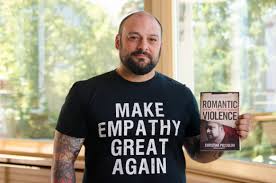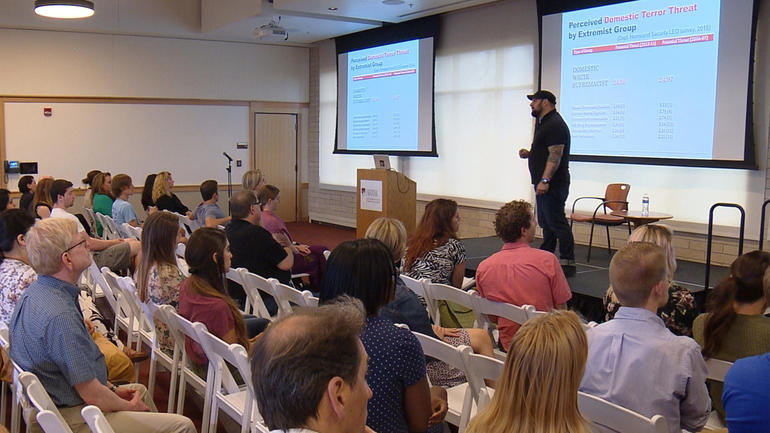|
Culture of Empathy
Builder:
Christian Picciolini
Christian Picciolini is
an American musician
and author who is the co-founder of a nonprofit peace advocacy
organization called Life
After Hate.
He wrote a memoir, Romantic
Violence: Memoirs Of An American Skinhead,
which details his time as a leader of the American White
power movement.
Wikipedia

Links
Quotes
"Hatred is bred through ignorance. Fear is its father, and isolation
its mother. Yet, we are born of empathy and so we hope to return."
-
Christian Picciolini
"Christian Picciolini: We caught that individual and we proceeded to
beat him brutally. And at one point when I was kicking him on the
ground and his face was swollen, covered in blood, he opened his eyes
and they connected with mine. that was the first time I felt empathy
for one of my victims. And that was the last time I hurt anybody."
- Christian Picciolini, 60 Minutes
"The truth is, I never met or had a meaningful dialogue or
engagement with anybody that I thought I hated. And when they took the
step to try and reach me, the demonization of them that I had in my
mind started to crack. "
- Christian Picciolini, 60 Minutes
"He advised parents and teachers not to "attack or confront" those
drawn into extreme, black-and-white thinking, but to "build a bridge
of empathy" and listen -- to try to understand the underlying pain,
even if the ideology is abhorrent."
-
Christian Picciolini
“It’s kind of the same thing you look for if your kid’s getting into
drugs or getting into gangs,” Picciolini said, adding that parents can
pre-empt this by teaching children empathy and supporting their
passions."
-
Christian Picciolini
"I'd
traded my natural empathy for acceptance. I confused hate and
intimidation with passion, fear with respect....When I reconnected
with the empathy I had as a child and accepted compassion from others
when I probably least deserved it, the hate disintegrated and my
warped ideology stopped making sense."
-
Christian Picciolini
"Over time, my customers and I would strike up conversations about
music that led to deeper discussions, allowing me to humanise people
that were once the objects of my hate. I began to develop empathy for
them – and also received it at a time when I least deserved it, from
those I least deserved it from. Once I began to connect with others
that I once hated, I could no longer justify that hate."
-
Christian Picciolini
Articles
Former Skinhead Discusses Importance of Compassion to
Charlottesville Community
Feb 03, 2018
by Emmy Freedman
"He says the key to breaking hate is to be compassionate toward people -
even if you don't think they deserve it. He says compassion is what
helped transform his life. Picciolini says if people are silent,
extremist activities are going to continue to happen. And if people
react with violence, it will play into their narrative."
How I Became a White Supremacist
Christian Picciolini
"Like most people who are caught up in someone's charisma, when I was
told these "white lies," I looked for evidence that my recruiter was
right, not wrong. When I look back on that time, I can barely breathe.
How could I have been so stupid? So gullible? So unfeeling about the
pain I so readily inflicted on innocent people? I'd traded my natural
empathy for acceptance. I confused hate and intimidation with passion,
fear with respect.
Once I finally made this stark realization, it was the beginning of a
new life for me. Once I reached the point of finally letting go
completely of all the lies I'd let in, that's when change began to take
hold. When I reconnected with the empathy I had as a child and accepted
compassion from others when I probably least deserved it, the hate
disintegrated and my warped ideology stopped making sense."
I was the leader of America’s deadliest neo-Nazi gang
"Over time, my customers and I would strike up conversations about music
that led to deeper discussions, allowing me to humanise people that were
once the objects of my hate. I began to develop empathy for them – and
also received it at a time when I least deserved it, from those I least
deserved it from. Once I began to connect with others that I once hated,
I could no longer justify that hate."
Finding forgiveness for a racist - 60 Minutes
Why forgive a man who committed violence in the name of white supremacy?
60 Minutes asks that question of two men on either side of a
racially-charged incident

|







